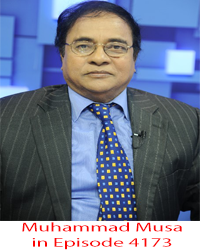Muhammad Musa

| Writer & Former Bureaucrat |
| Writer |
Full Name: Muhammad Musa
Affiliation: BCS Freedom Fighter & Mujibnagar Officer's Association
Current Position: General Secretary
Date of Birth: October 30, 1951
Place of Birth: Bangladesh
Home District: Satkhira
Nationality: Bangladeshi
Profile:
Muhammad Musa (born 30 October 1951) is a Bangladeshi writer, columnist and former bureaucrat. He is a former Secretary to the Government of Bangladesh and Secretary-General of the Freedom Fighter Officers-Employees Welfare Association of the Republic.
Musa is the kind of man of whom legendary tales of bravery and patriotism are told to future generations. The second son of award-winning teacher, celebrated raconteur and scholar Imam Moulavi Ahmed Ali. He was student of Chittagong University and earned double MA (MA Bangla 1st class, MA, Political Science 1st Class). He is an author, broadcaster, raconteur, journalist, freedom fighter and patriot is more popularly known under his pen name, Musa Sadik’. In 1970-71, he first showed great promise in writing and in all matters that affected his beloved nation and became a reporter of Daly Azadi of the port city of Chittagong and the university correspondent of the Daily Ittefaq then and now, the most highly-respected national daily newspaper in Bangladesh.
It was on Martch 26, 1971; Musa answered the patriotic call of his occupied land and suppressed nation and the impassioned plea of Bangabandhu sheikh Mujibur Rahman, the father of the Bengalee nation. He joined and actively participated in the Liberation War in Sector 9 at Satkhira-Khulna at the beginning. In no time he made a name as a valiant freedom fighter in various war fields and earned the admiration of the Sector commanders and fellow freedom fighters.
Later, in need and appreciation of his journalistic background, the Government of Bangladesh-in-exile appointed him War Correspondent of the Liberation Radio of Bangladesh, popularly known as “Swadhin bangla Betan Kendra.” Musa moved with the Allied Forces (Indian Army) and Muktibahini (freedom fighters of Bangladesh) and reported daily on their activities to the vast listening audience, which radio enjoyed in those days. His dispatches from the war fronts were both morale-boosting and inspirational for the people, then under the occupation of the Pakistan forces, and were eagerly awaited and appreciated by all.
Broadcasts of his two weekly features “Ranangan Ghure Elam” (on return from the war field) and “Muktanchal Ghure Elam” (from the liberated areas) became compelling listening for both young and old, the main topic of tea-room social discussions across Bangladesh (then known as East Pakistan) and a vital source of valuable information on the war for Governments worldwide.
As war Correspondent, Musa risked his life countless times to bring the frontline news into living rooms of homes across the nation. Before Sector Commanders devised their war strategies, it was a regular occurrence for him to be asked to slip behind enemy lines and gather vital information about enemy maneuverings and defense positions. In the first week of December 1971, he was captured at Chachra (Sector 8) by the Pakistan Army and was fortunate to escape death after four days of inhumane torture at the hands of the Pakistani military interrogators. The scars he bears today are a constant reminder of his past.
In 1971 Musa’s articles explaining and defending the cause of the Liberation War of Bangladesh were syndicated worldwide and published in many of the worlds’ most respected journals.
Musa has written a book on the history of the Liberation War of Bangladesh in Bengalee titled “Muktijuddya Hridaye Mamo”. The book was published by Bangla Academy in 1996 and followed by a number of editions.
Musa is married to Joyce and have two sons Mehmood and Marmun and lives in Dhaka.
Register for comment









